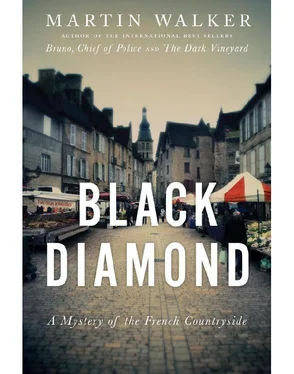Martin Walker - Black Diamond
Здесь есть возможность читать онлайн «Martin Walker - Black Diamond» весь текст электронной книги совершенно бесплатно (целиком полную версию без сокращений). В некоторых случаях можно слушать аудио, скачать через торрент в формате fb2 и присутствует краткое содержание. Жанр: Полицейский детектив, на английском языке. Описание произведения, (предисловие) а так же отзывы посетителей доступны на портале библиотеки ЛибКат.
- Название:Black Diamond
- Автор:
- Жанр:
- Год:неизвестен
- ISBN:нет данных
- Рейтинг книги:3 / 5. Голосов: 1
-
Избранное:Добавить в избранное
- Отзывы:
-
Ваша оценка:
- 60
- 1
- 2
- 3
- 4
- 5
Black Diamond: краткое содержание, описание и аннотация
Предлагаем к чтению аннотацию, описание, краткое содержание или предисловие (зависит от того, что написал сам автор книги «Black Diamond»). Если вы не нашли необходимую информацию о книге — напишите в комментариях, мы постараемся отыскать её.
Black Diamond — читать онлайн бесплатно полную книгу (весь текст) целиком
Ниже представлен текст книги, разбитый по страницам. Система сохранения места последней прочитанной страницы, позволяет с удобством читать онлайн бесплатно книгу «Black Diamond», без необходимости каждый раз заново искать на чём Вы остановились. Поставьте закладку, и сможете в любой момент перейти на страницу, на которой закончили чтение.
Интервал:
Закладка:
“Pons out, Pons out,” came the first, almost hesitant chant from the ecolos, not amplified with any bullhorn. Bruno saw that Pons’s son was gazing silently back at his father, their poses almost identical. But the bullhorn was by his side, and Guillaume didn’t move as the Greens behind him began a chorus of boos and jeers at the solitary businessman.
Bruno walked quickly through the gate toward Pons senior and spoke to him as a friend of many a rugby club dinner rather than as the chief of police of St. Denis. “Your car is parked around the side, mon vieux. I’d strongly advise you to get into it and leave now before we have trouble. There are women and kids here.”
“Don’t tell me what to do, Bruno, not on my own property,” Pons said quietly, not bothering to shift his gaze from the crowd at his gate. “I didn’t start this bordel de merde, but I’m walking out with my head high.”
“I’m going to have to walk with you then,” Bruno said.
“Suit yourself.”
Pons began striding toward the gate. The boos increased in volume, and some of the ecolos began a surge forward, only to be restrained by Pons’s son, who stretched out his arms to hold them back. There was a cold smile on his face as his father approached him.
Too fast for Bruno to intervene, the older man didn’t even break stride as he slapped his son across the cheek, so hard that Guillaume staggered and fell to one knee, dropping his bullhorn. Pons stalked on into the crowd of his workers, not looking back and not pausing as some of his employees cheered and slapped him on the shoulders.
White-faced except for the flaming red patch on his cheek, Guillaume shook his head and rose quickly, fury in his eye, surging forward after his father. Bruno wrapped his arms around the man to hold him back as Guillaume shouted, “You bastard, you dirty bastard!”
Bruno felt hands wrenching at his arms, then someone was hauling him back by the neck as Guillaume’s ecolos came to free their leader. Goaded into action, two of the younger workers from the sawmill piled in alongside Bruno, followed by a shrieking Axelle, who waded into the fray, raked her nails down Guillaume’s face and pulled on the lapels of his jacket to butt him hard in the face. She pushed him back, spitting in his eye as blood began to spout from his battered nose.
Bruno rammed an elbow into the man wrenching his neck and kicked back hard to free himself. He turned, picked up Axelle by the waist and thrust her back behind him, luckily into the path of Montsouris, who was steaming into the brawl with Marcel and a couple of the younger workers. Then the mayor and the baron were at each side of him, their arms in the air, advancing to make a gap between the two crowds and calling for calm. Bruno held up his hand to restrain Montsouris, and suddenly he heard the cawing of the rooks from the oak trees as a silence fell and all the angry energy seemed to leak away.
Everyone seemed chastened by the eruption of violence and the sight of blood. Axelle was sobbing quietly as Father Sentout led her back to Emile, who was kneeling as he held his dumbstruck children. The priest helped Bruno steer the townspeople back along the fence to the road that led to town.
“I’ll see the old ones back,” said Father Sentout. “That was a very sad moment, the son and the father.”
“Whatever happened to the Pons family, it was all before my time. Do you remember any of it?” Bruno asked.
“There was a very ugly separation when the boy was twelve or so, and he left for Paris with his mother. I think they got divorced in the end. I heard she died in Paris, it must be fifteen or twenty years back.”
Bruno nodded as Father Sentout gave his arm to two elderly women. Old Pons himself was helping Rosalie. The mayor would know the background, thought Bruno, or perhaps the baron. Whatever the origins of the family feud, the return of the son meant that it could become Bruno’s problem. He turned back toward the sawmill and paused to take in the arresting tableau.
But for the chimney and buildings of the sawmill, the scene reminded him of one of the religious paintings in the church of St. Denis. Guillaume Pons lay on his back, his head on Pamela’s lap and blood all down his shirt, while Fabiola, the young doctor from the St. Denis medical center, tended to his battered face. The mayor and the baron stood solemnly at each side of them, and Albert was kneeling at Pons’s feet. Around them stood the silent ecolos, looking down at the son felled by his father.
Bruno remembered precisely the last time he had studied the painting. He had been sitting near it during the Easter choral concert in the church, when Father Sentout had spent weeks rehearsing the choir for a performance of Haydn’s “Seven Last Words of Our Savior on the Cross.” Bruno had remembered studying the photocopied text of the work and Father Sentout’s short commentary. One of the phrases had stayed with him, and emerged again now, unbidden, into his head. Eli, Eli, lama sabachtani -Father, Father, why hast thou forsaken me?
2
Bruno loved to drive in the baron’s old Citroen DS, a car that had been built before he was born. He enjoyed the way the car hardly leaned when cornering and how it still looked like the most modern car ever made. Bruno had heard the baron sing its virtues a score of times: that it had been the world’s first car with disc brakes and hydraulic suspension and some other features he could never quite remember. But one thing the baron had ensured Bruno never forgot was that it had saved the life of the baron’s hero, Charles de Gaulle, whom he always called le general, rather than president. During one of the several assassination attempts in the 1960s by the OAS, the military and colonialist rebels who wanted to keep Algeria French, the car’s tires had been shot out, yet it could still drive away at full speed. Every time the baron’s DS came in for service, Lespinasse at the garage would almost purr with pleasure.
“Did you know I bought this car from Pons?” the baron asked, his eyes on the narrow road ahead, dense trees on either side flickering past in the glow of the headlights. It was still an hour before dawn, but they had wanted to be at the Ste. Alvere market before it officially opened at 8:00 a.m.
“It must be over twenty years ago, maybe more, not long after his wife left him. I got it cheap. These days they can go for over a hundred thousand at classic car auctions.”
“You’ll never sell this,” Bruno said. “It’s part of you. But I wanted to ask you about Pons. How come the wife left?”
“I’m told he used to beat her. She came from the south, near Carcassonne. Got a job teaching at the college here. A real beauty, blond hair but with that lovely golden skin you sometimes get in the Midi. I was living in Paris then, and Pons had already grabbed her when I came down one summer. Olivia, her name was.”
“Jealous?”
“I certainly was.” The baron laughed. “But then things changed. Pons was never known for fidelity. She put up with it for a while. Then she started taking her revenge. I was one of the lucky ones. Not the only one, though. When Pons found out, that was the end of the marriage.”
“How was she doing, financially?”
“I helped her get a lawyer. She did okay. Pons was never mean about money, at least not where the boy was concerned. But I know he complained the boy never wanted to see him, that Olivia had poisoned the kid’s mind about him.”
“Did the boy know about you?”
“I doubt it. I’m pretty sure Pons never knew about me either, we were always discreet. I was married by the time she came to Paris.”
“Why the delay before she got a divorce?”
The baron shrugged. “Divorce wasn’t so easy in those days, not with the kid, and even trickier after she took the boy to Paris. Pons claimed she’d abandoned the family home, but the lawyer got her a decent settlement.”
Читать дальшеИнтервал:
Закладка:
Похожие книги на «Black Diamond»
Представляем Вашему вниманию похожие книги на «Black Diamond» списком для выбора. Мы отобрали схожую по названию и смыслу литературу в надежде предоставить читателям больше вариантов отыскать новые, интересные, ещё непрочитанные произведения.
Обсуждение, отзывы о книге «Black Diamond» и просто собственные мнения читателей. Оставьте ваши комментарии, напишите, что Вы думаете о произведении, его смысле или главных героях. Укажите что конкретно понравилось, а что нет, и почему Вы так считаете.












